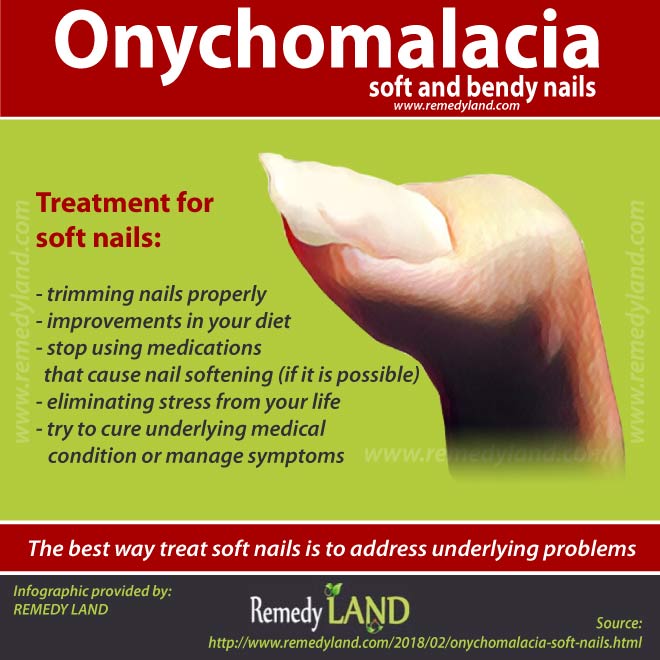What is onychomalacia? (definition)
Onychomalacia is a medical term for a nail condition in which fingernails or toenails become abnormally soft and start to break. People with weak soft nails have problems with nail injuries, because even slight pressure can bend or break them.
Page Contents
Why are my nails soft and bendy?
Nails are usually a representation of a person’s health. If the person is healthy and eating properly, its nails are strong and beautiful, and contrariwise, if the person have an improper diet and some internal disease, that person’s nails may be soft and week.
Onychomalacia causes
Soft nails can occur due to usage of certain medications, malnutrition, stresses, medical conditions or nervous disorders. All of those factors have influence on the nail’s matrix health, the part of the nail that replaces the old nail plate with the new one on a regular basis.

Soft nails caused by vitamin deficiency
If your diet is lacking in biotin (vitamin B7), onychomalacia can develop. This rare nutritional disorder can be very serious, it’s caused by a deficiency of the water-soluble B vitamin known as biotin. Sometimes, an excessive amounts of egg whites can cause vitamin B7 deficiency. The major symptoms of biotin deficiency include soft nails, hair loss, dry or scaly skin, depression, loss of appetite and tingling of the extremities.
Certain medications can cause onychomalacia
By blocking beta receptors, certain medications may also block the supply of essential nutrients to the nails causing them to be soft and weak. Studies has shown that some prescribed medication can deplete your body of critical nutrients and nutritional deficiencies can develop and worsen symptoms over time.
Stress can cause weak, soft nails
Stress can take a toll on a person’s nails. Prolonged period of stress can cause onychomalacia. The more you are stressed, the more it affects appearance and health of your nails, and make you more stressed in the process, the ongoing circle.
Onychomalacia induced by rheumatoid arthritis
Patients suffering from rheumatoid arthritis may experience a wide array of non-specific nail changes. These nail abnormalities range from “deep purple arch” to soft fingernails. Other main symptoms are swollen joints, stiffness of joints, loss of joint range, fatigue and weight loss.
Onychomalacia: treatment for soft nails
The best way treat soft nails is to address underlying problems which are causing onychomalacia. Soft nails treatments may include:
- trimming nails properly
- improvements in your diet (more vitamins and nutrients your nails need like biotin)
- stop using medications that cause nail softening (if it is possible)
- eliminating stress from your life
- try to cure underlying medical condition or manage symptoms

